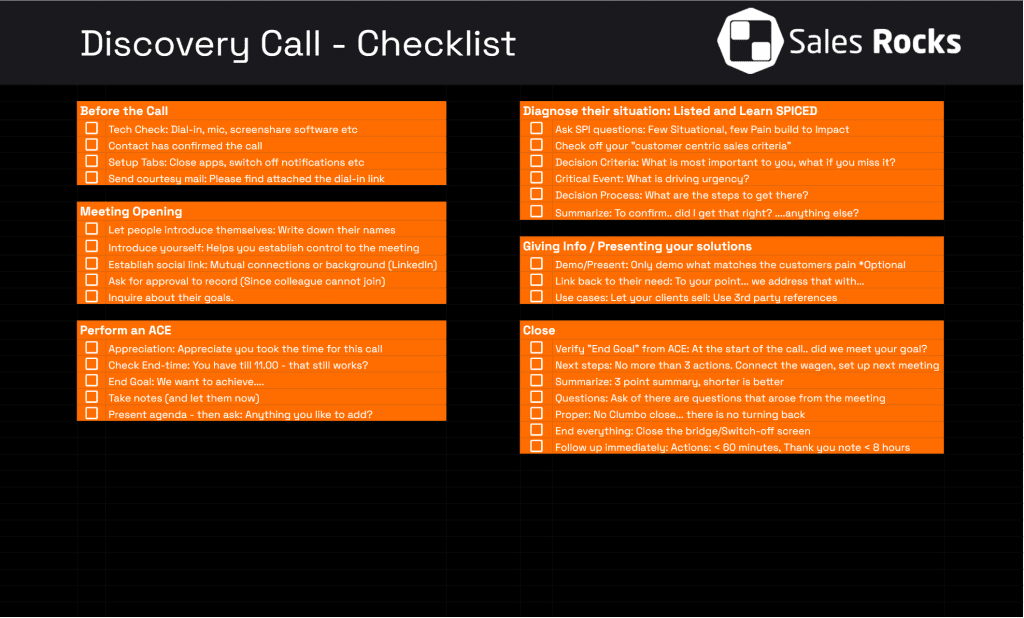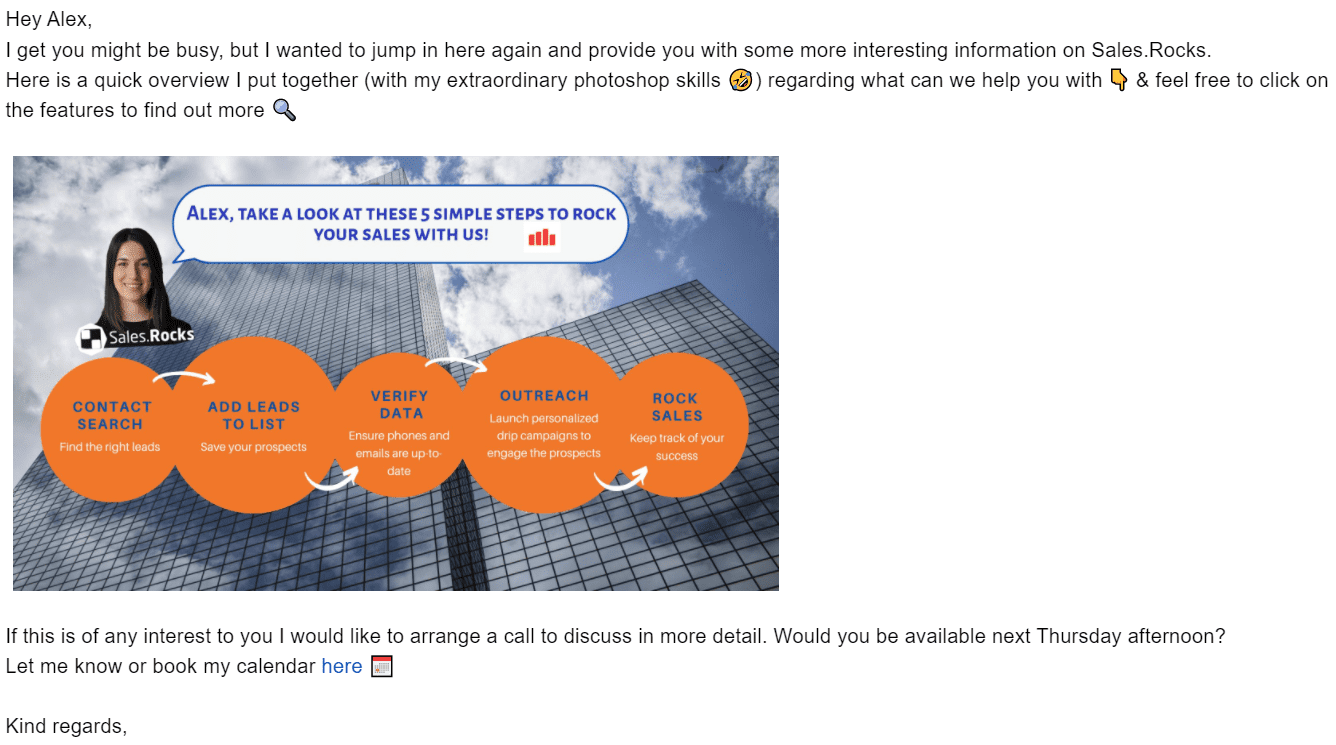Updated on January 5, 2023
Salespeople, especially SDRs, BDRs, and AEs usually have to dedicate a lot of time to the initial stage of sales to qualify the best buyer persona and to determine the possible benefits for both the potential customers and the product itself. In these first steps, engagement through calls with prospects is a key indicator and the most important segment that directs the success rate of sales. In other words, a sales discovery call and a demo call are the way to go.
Before we dive deeper into the most fun part of the calls, it’s crucial to understand what these calls are and what’s the purpose of having them.
What is a sales discovery call?
A sales discovery call (or a Disco Call as we like to call it) is the first leap towards the process of establishing rapport with a potential client in the sales journey. It is usually a fifteen to thirty minutes call where salespeople get to know the prospects and try to discover and understand their challenges in order to qualify them properly and to be able to help further.
Essentially, in B2B sales, this step is the most important one as its purpose is to allow both salespeople and potential customers to get to know each others’ businesses better, to see the mutual benefits, decide if there are any and how shall they move on to the next stage.
That said, here are a couple of crucial points when it comes to conducting a prosperous discovery call:
1. Do the research before the call
Before having the meeting or picking up the phone to call the prospect, sales representatives should research their prospect properly. This means that extensive research on the prospect’s job position, location, their company’s key activities, and details are needed.
An easy way to do this is to type in their company name into the search bar on Google and see what you can find. Also, LinkedIn works great for more information on the prospects’ role in the company, what they do and what are their interests.
However, the easiest way would be to have all of this in one place. Sales prospecting tools, such as Sales.Rocks, usually gather different data, including all the company information available online, info from social media profiles, and local registries to sum up a comprehensive company profile. This is exactly what you need to save time on manual effort.
This part of the sales prospecting process can be done through the Contact Search on Sales.Rocks and the right filters, such as a specific job position, exact location, industry, phone numbers, direct emails, and LinkedIn profiles of your potential leads.
For information about their particular company, the Company Search option is ideal to get the company details such as HQ location, founding year, number of employees, company activities, revenue range, company phone number, general email address, and website.
The relevant data can be exported to your computer or CRM and the research will be in one file – a whole bunch of information that you can explore through and get well prepared to show the prospect you actually took the time to research and show interest in what they do. This will help you build trust and a meaningful relationship with the prospects from the very first minute of the call.
2. Set the discovery call agenda (with a checklist)
In order to have a productive flow of the discovery call, besides researching, it’s important to set the structure of the call, so you and the prospects know the whole agenda and what to expect during the call. This doesn’t have to be very complex and lengthy- just a couple of crucial points to be covered in the meeting.
Furthermore, from a salesperson’s perspective, it’s always good to have some questions prepared for the prospect. When you have the agenda set, it’s much easier to dictate the pace and ask questions relevant to the solution you want to present and leave time for prospect’s questions too.

3. Offer the right solution
The discovery call is not about selling the product or service right away. It’s important to build a stable relationship with the prospect and understand their challenges, so the help would be inevitable. What’s even more crucial is to offer them a solution and not just a product. Understanding their current challenges through the questions asked will help in the assessment of which tools and functionalities would work the best for the potential customer. Ideally, presenting your product should have an emphasis on the most useful tool in that particular case.
4. Settle the next steps
At the end of the call, the biggest question arises. What now? The easiest answer would be what the prospect suggests and the most logical one is to schedule another meeting session i.e. demo call to show the potential customer all of the product features, how they function in detail and which benefits the features would bring in solving their challenges within the company.
What is a sales demo call?
A sales demonstration call or in short, a sales demo, is a detailed presentation of a product or service to a potential customer. This is the following step after having a sales discovery call and the main concept of the sales demo call is to show the features, their functionality, value, and benefit of the whole solution to the potential customers.
Why is the product demo call crucial for the buyer’s decision?
Primarily, as the purpose of the sales demo is to present a solution in detail along with its benefits, it’s significant to personalize each aspect of the product demonstration to be relevant to the buyer. In this way, the potential buyer can have a clear understanding and vision of how the particular solution can assist them in resolving their challenges and achieving their company’s goals.
The right sales tool for your sales
Sell more with Sales.Rocks
Top 3 “must-knows” to bear in mind while having a demo call
1. Know your buyer
So far, we’ve seen that discovery and demo calls go together like peanut butter and jelly. These steps are inseparable and of paramount importance when getting to know the potential buyer and their challenges. So, once we are familiar with those obstacles, personalizing the calls and proposals for them is key to closing the deal.
The best practice in this stage would be presenting the solution and demonstrating the benefits through crafting the demo call based on all of the insights from the sales discovery call. Make sure to show the potential buyers that you understand their pain points, their needs, and goals and customize the demo to the product’s features that are most useful in their specific case.
2. Know your product
The product demo is all about the audience and sales representatives must know how to present the product to potential buyers. However easy it may sound just showing a product, this process requires a strong knowledge of the product in order to deliver it properly which will result in scoring a big sale.
Before having this type of call, make sure you test out the features of the solution you offer, get familiar with their technical function, usage, and benefits. This will result in more confidence while explaining to them one by one and presenting the solution at a decent level to buyers.
3. Know your purpose
Even though the initial reason for holding a demo call with a potential buyer is to actually sell them the product, make sure to offer them help and a solution for their specific needs and portray the features as the solution for their pain point, indeed.
By the end of the demo, make sure you understand their point of view and what they actually think about the product rather than rushing to place an offer for what you believe will help them. Let the potential buyers decide what is best for their company and let them choose the next steps from this stage.
Scheduling sales disco calls and demos through Sales.Rocks email outreach (with the actual email templates)
Now, let’s go back to the pre-sales stage (before the era of disco and demo calls starts) and take a look at a campaign made by one of our SDRs, here at Sales.Rocks that has resulted in scoring 5 calls a week, 2 big offers, and a lot of referrals to new potential clients of the platform.

What’s really cool with an email campaign such as this one is that setting it up and checking the statistics (a.k.a your success) is easy peasy lemon squeezy. Plus, when you have the contacts already added to a list in Sales.Rocks, it’s even better.
Once you crafted the email content (pro tip: it can be as personalized as you want with the help of custom tags), connected the emails, and started the campaign, you can track key actions taken by the contacts regarding who opened which email, when they opened it, whether they clicked on some links or images in the emails and most importantly, you can check who replied to your emails too.
As we are here to help you rock your sales, here is the whole campaign content that turned out to be one of our BEST ones recently.
The Opening email

Follow up #1

Follow up #2

Follow up #3

Follow up #4 and last email

Final words
We can agree, discovery and demo calls are the best parts of the initial sales process and it takes only a little bit of effort from both parties to make things great. Meeting, chatting, and helping people through promoting services is a fun way to make prospects realize the value of your product.
So, make great use of it, choose the right tools for you, and enjoy your success!
Learn how to drive more sales


